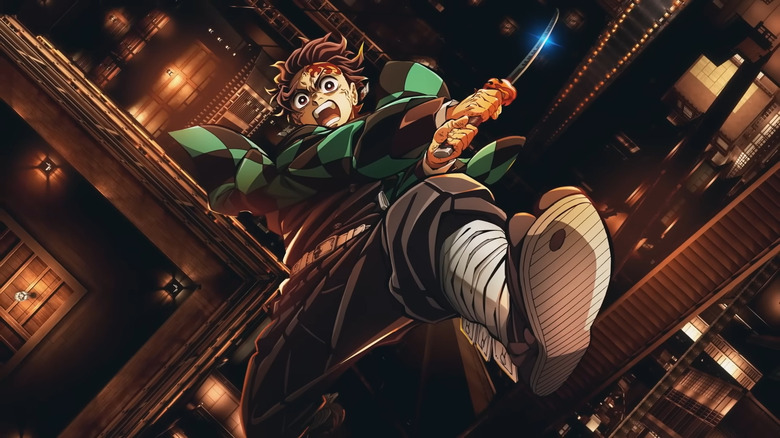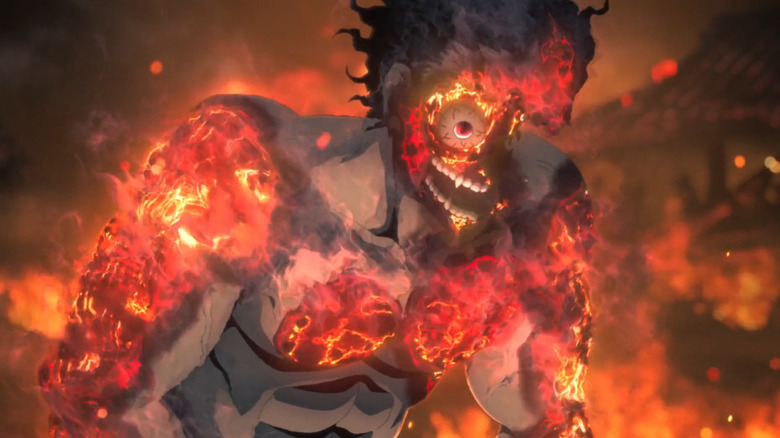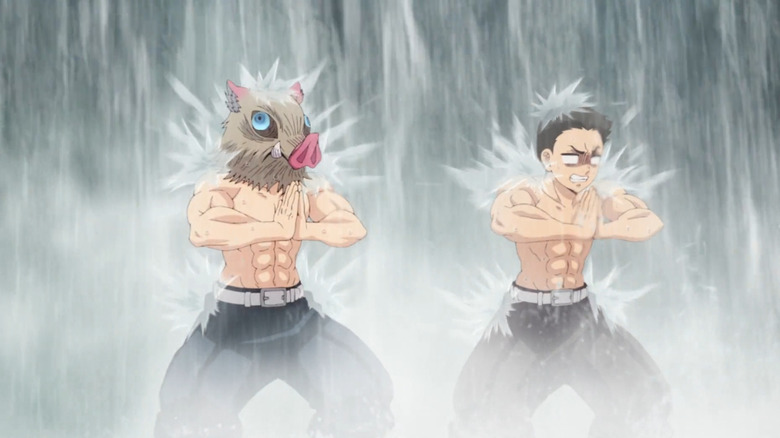Why Demon Slayer Is Coming To An End At The Height Of Its Popularity
It's the end of an era. Following the release of the final episode of "Demon Slayer" season 4, Crunchyroll announced it will release "Demon Slayer: Infinity Castle" as a trilogy of films to cap off the hugely popular adaptation of Koyoharu Gotoge's manga of the same name.
The anime follows Tanjiro Kamado, a boy whose family is killed by a demon and who decides to join the elite Demon Slayer Corps in order to find a way to turn his younger sister, Nezuko, into a human after she got transformed into a demon. This news may be surprising to some fans, especially considering the show just premiered in 2019 which — despite what the COVID-19 lockdowns did to our brains — was technically not that long ago. What's more, finishing the story with not just one but three films seems like a surprising move when anime movies based on TV shows are most often just standalone side stories unrelated to the main plot.
When it comes to "Demon Slayer," though, this decision not only makes sense, but it's also what the adaptation has been building to from the start and the ultimate expression of what Ufotable has done adapting the manga. "Demon Slayer," itself the biggest anime of the moment and the defining anime of the 2020s, was always destined for the big screen, for better and worse.
Let's get something out of the way first. "Demon Slayer" is ending because, well, the manga ended and the anime just reached the final arc of the source material. Sure, it could've been extended with filler arcs — much like how the show previously turned the "Hashira Training Arc" into an eight-episode season of TV when a series of short montages would've done the job — but the story didn't have many other places to go.
Demon Slayer was always going to be a short anime
Part of why Gotoge's manga of the same name was so incredibly popular was that it always cut to the chase and knew when to end things. Despite a slow start — both in terms of story and sales — the manga quickly became a global phenomenon, in part thanks to the anime adaptation but also just because it tells a rather effective little story. There isn't much in terms of surprise of subversion, but it's still an exceptionally well-executed action shonen. There's little in terms of downtime; instead, it maintains a fast pace while going straight for the highlights.
The results speak for themselves, with "Demon Slayer" becoming to this generation of manga and anime fans what "Naruto" was in the '00s and "Dragon Ball Z" was in the '90s. Unlike those two, however, "Demon Slayer" managed to tell its story in just 23 volumes or 205 chapters, which is rather short for such a big Shonen Jump title.
So yeah, "Demon Slayer" was always going to be a short anime, but why a trilogy of movies? Well, that's both the biggest gift and curse of this franchise.
These days, big anime adaptations split their seasons according to the story arcs they are adapting. The problem is that not all story arcs are equally long, meaning you're going to get to a point where an arc could be done in just four episodes. Rather than combine story arcs in the same season, which shows like "Attack on Titan" and "My Hero Academia" constantly did, "Demon Slayer" broke the mold in 2020 by revealing that the "Infinity Train Arc" would be adapted as a theatrical feature film rather than an extra-short season.
Demon Slayer reflects the new normal for anime
"Demon Slayer: Mugen Train" was a monumental success, becoming the highest-grossing film of 2020 worldwide and kickstarting a trend wherein the show would release a season finale plus the premiere of the next season as a compilation movie in theaters, only to make serious bank at the box office Effectively, Ufotable and Crunchyroll have made millions out of, to quote Homer in "The Simpsons Movie," people "paying to see something we get on TV for free."
Unsurprisingly, other shows took notice and are now attempting the same thing. "Haikyu" is finishing its story with two movies, "Attack on Titan" ended its run with a feature-length final episode, and "Chainsaw Man" is going to adapt the next arc in its story as a movie. This is not just a smart move money-wise, but story-wise it makes sense to adapt shorter stories into movies rather than stretch them over several weekly episodes — or, in the case of "Attack on Titan," give them the big-budget, epic-scale that the story warrants.
In the case of "Demon Slayer," this is a show that has always taken simple, short, to the point fights in the manga and expanded them through beautiful animation. It's the reason the show exploded in popularity in the first place, with episode 19 of the first season taking an unremarkable fight and turning it into the best animated sequence of 2019. The problem is that the show got high on its own supply and started stretching what was a short and effective manga into an endless parade of gorgeous but repetitive fight scenes, expanding the story for the sake of eye-candy. Ending the show with a movie trilogy feels right, but not exactly for the right reasons.


